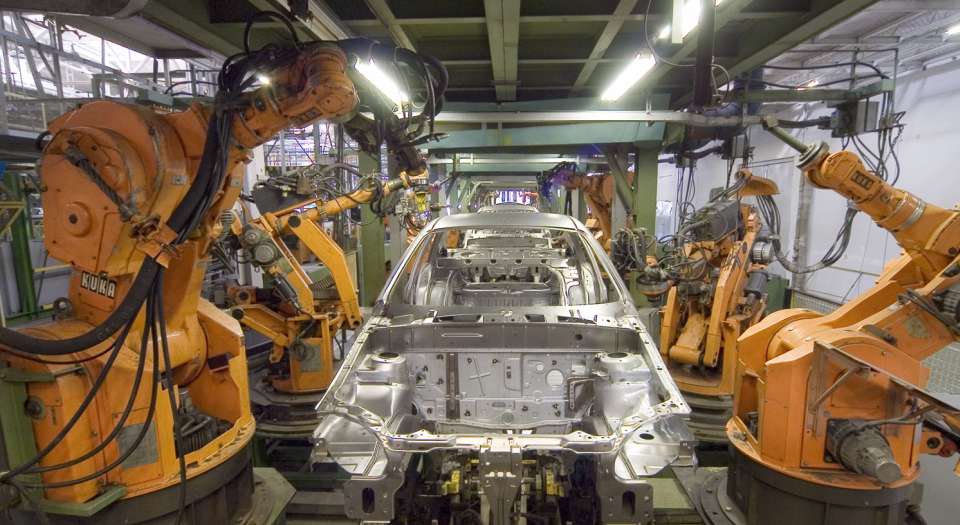We need to talk about the economy
The state is propping up a zombie economy. Why isn’t this an election issue?

Want unlimited, ad-free access? Become a spiked supporter.
The UK economy is officially flatlining. At the start of April, the Office for National Statistics (ONS) published its latest assessment of British productivity trends. Its first ‘key point’ at the top of page one could not have been clearer: UK productivity not only fell in the last quarter of 2014, but it also remained flat for the whole of last year. It was still slightly lower than in 2007, prior to the economic downturn. The ONS went on to highlight that ‘such a prolonged period of essentially flat productivity is unprecedented in the postwar era’ (1).
There is no more important indicator of the health of an economy than productivity – that is, a measure of how much wealth in goods or services people are able to produce in a fixed time. Productivity, its level and growth, trumps everything else when it comes to determining our living standards, and what a society can afford to invest in the future, be it in public services, the welfare safety net, or anything else. The dearth of productivity gains is at the root of all the other important contemporary economic issues: the financial crash and its repercussions; stagnant wages for some in work and lower starting wages for many taking new jobs; and the falling tax revenues that have led to fiscal deficits and rising public-debt levels. All of these are caused by low productivity growth.
In Britain, productivity growth has fallen from about three per cent each year in the early 1970s to one per cent each year at the end of the first decade of the 2000s (2). If this trend was sustained, it would mean that instead of the rate of wealth per person doubling with every generation, or approximately every 25 years, it would double over a lifetime, or approximately every 70 years. Even grimmer, if the stagnant productivity of the past eight years were to continue, we would never see prosperity rise again.
Yet this dire record of economic stagnation has not been an election issue. The parties have been silent. Even the word ‘productivity’ barely registers in the manifestos: four times in the Labour Party’s, twice in the Tories’, and nowhere at all in those of the Liberal Democrats, UKIP and, perhaps less surprisingly, the Greens.
When something as fundamental to wealth creation as Britain’s flat productivity is not being discussed, it shows us the extent to which the economy in general has been missing as an election issue. Instead of offering their competing ideas on what to do to revive wealth generation, the parties have offered little more than a distracting charade, a repetitive to-and-fro over tax-and-spend policies and competing claims as to how to ‘balance the books’.
It is fair enough that the question of the public finances should feature somewhere in the election, but it is really secondary to the far larger issue of economic performance. Public finances are not to be confused with the economy – they merely refer to a way in which the economic wealth produced can be used. Today’s persistent public deficits and debts can reasonably be presented as symptomatic of an economy in trouble. They ought also to act as a motivation to fix the productivity problem.
This should be easy for politicians to grasp. For example, at the end of last year, the Office for Budget Responsibility (OBR), the government-created forecaster for public finances, helpfully estimated the different impacts two scenarios would have on the level of public debt by the end of the next parliament. In the first scenario, the abysmal productivity record of the past five years continued. In the second scenario, productivity returned to a level of three per cent, similar to that of the early 1970s. The OBR said the difference in public debt between the two scenarios amounted to 30 per cent of gross domestic product (GDP), a hefty and meaningful difference when compared with the current debt level of about 80 per cent of GDP. In money terms, it’s a difference of about £600 billion.
Restoring those earlier productivity levels would therefore negate the need for any further spending cuts to eliminate the deficit by 2020. It would also turn the debt impact of the difference between the various public-spending perspectives of the parties, not least the projected £30 billion gap between Labour and Tory plans in 2020, into little more than a rounding-up error (3). However, politicians have refused to take the OBR’s hint. Instead, the question of how to fix production has been evaded by all the parties.
Against the dispiriting background of this debate-dodging election campaign, there is one thing we need more than anything else before the economy can begin to recover. Just one thing, from which all the economic policies and implementation plans can flow. And without this one thing, it will be impossible to have a durable economic revival.
That one thing is an outbreak of honesty — an outbreak of intellectual honesty about the true economic situation and challenges now facing Britain. We need to recognise that our economic problems are systemic and structural, that we are stuck in an economic depression, with a zombie economy, dead in productive dynamism but propped up to look as if it’s alive.
For far too long, the people in charge, not least the current batch at Westminster, have evaded the truth of being stuck in depression. Instead, some have offered superficial assessments of what’s going wrong, and what’s supposedly going right with the economy, as if any problems we’re facing are transitory, or are just tougher versions of normal cyclical problems. Others have claimed that the economy’s problems are due to persistent external forces, such as the continuing fallout from the 2008/09 financial crash, or what some call non-economic ‘headwinds’, such as demographic ageing, or technological exhaustion.
But politicians can’t legitimately hide the British economy’s failings behind international economic trends. A couple of months before the ONS highlighted Britain’s unprecedentedly flat productivity, it drew attention to how poor Britain’s economic performance was relative to that of other countries. Again, the ONS’s verdict in its latest international productivity bulletin was unequivocal. ‘Output per hour in the UK’, it said, ‘was 17 percentage points below the average for the rest of the major G7 advanced economies in 2013, the widest productivity gap since 1992’ (4). Not much sign of improvement there, then.
Politicians are refusing to recognise the reality of productive decay. They continue to kid themselves that the economy is already on the mend. As the Tories say, Britain simply needs more of the same policies (5). Or, as Labour says, we just need to share the prosperity from the country’s economic recovery more fairly to reach more people (6).
The intellectual honesty we need today has to extend to admitting that Britain’s principal economic problem, the broken engine of production, has been a problem since well before 2008. In fact, the productivity problem goes right back to the economic slowdown of the 1970s. That is when our long depression really began. That is the point at which the long-term decay in productivity growth started.
Economic life in a time of depression is a mix of resilience and vulnerabilities. As a result of the forces of resilience, we can have modest and even prolonged periods of output growth. In Britain’s case, this period of resilience extended from the 1990s into the new millennium. At other times we see the vulnerabilities expressed in spikes of instability, as with the recessions of the early 1980s and early 1990s, or the financial turmoil of the dotcom bubble bursting at the start of the 2000s, and the much bigger late-2000s credit crash.
The expansion of debt has been the prime source of economic resilience. More recently, it has been the prime source of vulnerabilities, too, but this is often downplayed, or even accepted as a fact of economic life. Given today’s focus on public finances, it is worth recalling that this debt-driven economy, whose origins lie in the 1970s and, especially, the 1980s, was predominantly private in form. It took place through the expansion of private debt – business, financial and personal – much more than the expansion of public debt. It grew for one simple reason: the economy was no longer able to produce enough value to pay its way. Instead, the economy coped by borrowing from wealth that had not yet been created, and for which there was very little prospect of repayment.
For politicians to mix up resilience with genuine economic strength is to be dishonest to themselves and to us. Being unable to face up to the scale of our economic difficulties means putting off confronting the problems and evading hard decisions in the fatalistic hope that things will improve on their own. This failure to confront reality is likely to lead to the same failings and counterproductive treatments that have dogged successive governments.
It is because those in charge failed to address the decay of production even after the shock of the financial crash that this debt-based economy continues. Hence very few debts have actually been repaid since the crash – the widely predicted ‘deleveraging’ never happened. Today, the total debt level continues to rise in Britain, as it does in many other advanced economies. And yet UK politicians seem happy with this state of affairs as they compete during the election campaign to encourage more mortgage-debt-based property buying.
An alternative approach
So what are the practical steps that could be taken to revive productivity? The positive ones are not difficult to identify. We need more science, experimentation and research and development (R&D) to generate more invention and fuel the development of new technologies. All of this is needed across multiple areas, going way beyond the faster, more compact and ‘smarter’ personal IT devices that have become so ubiquitous.
Then, on the back of these broader discoveries and technologies, we need a wave of innovating business investment across all industrial sectors, from transportation and communications to energy and medicine. And that means we need a lot more start-up businesses, because while we know that most of these fail, we also know from history that they are the leading channels for innovation. Plus they encourage the stronger established businesses to innovate in order to keep up. Finally, we need more businesses investing in training their workers in any new skills required to use these improved modes of production.
Listing what should be done makes it all sound relatively simple. However, we also need to be honest enough to admit that none of this will happen spontaneously. Individual businesses won’t suddenly get their acts together. We therefore also require a fresh approach towards what has to happen collectively to bring about this long overdue economic restructuring.
This means going beyond the stale diatribe of ‘less state’ versus ‘more state’ – the old free-market and Keynesian perspectives. Instead, the state will need to do both less and more, at the same time. The ‘more’ is, again, easy to list: more funding for, and facilitating of, R&D; more help for start-up businesses to initiate that necessary upsurge in innovating capital investment; and more infrastructure investments, which will also play a role given the self-evident constraints in many areas of public infrastructure, not least in transportation (for example, airport capacity, roads, railways and ports).
Interestingly, some of this ‘more’ required from the state is already there in the words, or at least in the spirit, of the main party manifestos – even if it’s on nothing like the scale needed. But what is nowhere to be found in the manifestos is what the state needs to do a lot ‘less’ of. It needs to stop supporting the zombie economy.
This is going to be difficult. It goes against the nature of pretty much all British and Western economic intervention over the past 30 years. It used to be the case, before the 1980s, that modern states balanced two economic roles: promoting economic growth and maintaining economic stability. The emphasis in recent decades has shifted overwhelmingly to the maintenance of economic stability.
The state has become what I call a ‘conservator state’, working to preserve and protect the status-quo economy, which means preserving an essentially stagnant economy. Since the second half of the 1980s, state institutions have increasingly promoted policies favouring the stabilisation of capitalism at the expense of economic growth. This has blunted and held back the market tendencies towards creative destruction. This means that the state, by acting to preserve what exists – and this goes right back to Thatcher’s time – has itself become a barrier to the restructuring of production.
Tying up resources in propping up the old economy is the outcome, though not necessarily the intent, of state policies that favour stability over change. What’s more, this process further reins in the business dynamic needed for change that is already constrained by the depression. These policies have kept alive those low-productivity and loss-making zombie businesses that should have been allowed to go under. One practical consequence of this has been to reinforce the preservation of existing lower-value jobs. This helps to explain why there has been less job destruction and, in parallel, less job creation going on recently (7).
It is widely recognised that this conservator state does a lot to make life difficult for businesses through too much controlling regulation (made worse by the incessant regulatory tweaking which forever complicates business life). But the other aspect of conservator-state activity that is just as, if not more, significant for holding back economic renewal is the way it makes it easier for particular businesses, and for the economy as a whole, to cope with the effects of the depression. The state has developed an array of mechanisms to support businesses and the economy, but these only get in the way of the change that is a necessary prerequisite for fixing productivity. Productivity can’t be revived without the possibility of resources – funds and people – moving from old, lower-productivity activities to new, higher-productivity activities. The zombie economy, sustained by state mechanisms, gets in the way of this part of the renewal process.
These state measures have been developing since the late 1980s. Looser monetary policies have underwritten the expansion of that private debt, which has been so important to sustaining the old economy through the 1990s and 2000s. The state also supported the expansion of the UK’s financial sector, which has provided myriad loans, from the Big Bang reforms of 1986 to other regulatory changes since. More recently, the state’s quantitative easing (QE) programme has pumped money into the economy.
Alongside these monetary-type mechanisms, the state has also been providing an assortment of other de facto business subsidies. Other policy measures over the years include the various forms of public-private partnership, the regulatory support provided for privatised industries, as well as public-procurement policies that derive directly from government spending. These represent a relatively solid demand for goods and services, including the demand for the more prized parts of the British economy in pharmaceuticals and IT. Even state initiatives, like in-work welfare benefits, indirectly help business by subsidising low-wage employers. In all of these ways, the state has created a corporate dependency that is as debilitating for the economy as welfare dependency (which the state also created) is for individuals.
Most of these measures aren’t deliberate, calculated policies to maintain a zombie economy, but that’s their effect. They are more often acts that the state has stumbled upon in order to meet some immediate challenge, but which then become near permanent ways of operating. For example, QE was introduced as an emergency measure in the aftermath of the financial crash. Nearly seven years later, it has not been reversed in Britain (or anywhere else it has been used). In an emergency – such as the 2008 crash – calling the fire brigade is appropriate. But if the fire brigade of QE is still at the scene many years later, this is a sign that things are far from back to normal.
The state’s curbing of capitalism’s destructive tendencies has been evident in the expansion of Britain’s zombie economy since the financial crash. Even though more businesses now are unprofitable and making losses, fewer are going under (8). The headline figure of company liquidations from the UK Insolvency Service has remained much lower since the financial crash than it was in the early-1990s recession – this despite the fact that the late-2000s GDP collapse of about six per cent was three times as large as the early-1990s collapse. Moreover, the average annual rate of company liquidations from 2009 to 2012 was 17,000, which was not much of an increase on the average from the mid-1990s to the mid-2000s of 14,000, and lower than the 21,000 average experienced from 1991 to 1994 (9). The recent absence of a big rise in business failures has occurred despite the jump in the proportion of loss-making firms from about a quarter of businesses in the 1990s to more than a third since the crash (10).
Finally, we need to recognise that moving away from a zombie economy in the interests of economic restructuring would be a far from painless transition. But unfortunately there are no pain-free solutions to today’s problems. By maintaining the old stagnant economy, we are trading off the possibility of controlled economic change, that can bring progress, against spikes of uncontrolled change.
A less destructive capitalism initially seems a preferable thing, but it comes at the cost of a more static economy that can’t produce enough decent high-productivity, well-paying jobs. While any jobs provided by a zombie economy may seem better for people in the short term, because at least they are in employment, these are precarious jobs. Working for a loss-making business, and even for many profitable businesses today, provides a salary, but often not a generous one, nor one that can be expected to last for long.
The Tories claim the nearly two million new jobs created over the past five years have provided ‘security’ and ‘hope’ to British people, but too many of these jobs have been low-paying, insecure and have lacked prospects. Although employment levels in Britain have been better maintained over this period than in many other mature economies, this has disguised the decay in the composition of jobs. Workers have been trading down in employment into poorer-paying and less secure jobs.
While employment levels in Britain stopped falling in early 2010, most job growth since has been in self-employment and part-time work, not in full-time work. It took six years, until September last year, for the number of full-time employees in the UK to regain its 2008 level. By the time total employment regained the pre-crash peak level of 29.5million in 2012, its composition had changed: the number of full-time employees had fallen by 800,000 to just over 18million. This decline was compensated for by an increase in the proportion of self-employed workers, which reached a 15 per cent share of the total, and part-time workers, which reached a 23 per cent share (11). Four out of every 10 people in work are not in ‘standard’ full-time salaried jobs.
Between the 1980s and the late 2000s, roughly two-thirds of all employment was accounted for by full-time employees. But by last year this share had started to fall, because two-thirds of the job growth since the recessionary trough has been in the ‘non-standard’ part-time or self-employed types of employment. Unemployment is being disguised in Britain, this time as underemployment (12). People have been taking on inferior roles as a substitute for their preference for permanent full-time work.
As a consequence of this change in composition, there has also been a downward shift in the number and share of jobs paying a decent wage. The chart below, comparing 2010 and 2014, shows that waged jobs paying over £30,000 (in 2014-money terms) have declined during the recovery, falling by one sixth (one million) (13). While the government is proud that the number of employees had grown by 800,000 – with the other job growth it boasts about coming among the even more precarious self-employed – all the net growth in waged employment has been in jobs paying less than £30,000: a rise of 1.8million. In just four years, the share of employees earning less than £30,000 has increased from 64 per cent to 69 per cent.
Supporting a zombie economy trades the prospect of decent, better-paying jobs in the future for keeping people in worse-paying, more precarious jobs now. So by perpetuating the zombie economy we are taking one form of pain – including growing economic insecurity and hardship in work, punctuated by periodic and severe recessions – over the other form of pain that comes from losing those jobs, but with the opportunity of creating new and better ones in a restructuring economy.
Of course, the ‘less’ of state intervention – less propping up of a stagnant economy – will not work on its own, any more than the ‘more’ of a broader, more radical state-industrial policy will. Both parts are needed as part of a programme for economic renewal. Currently, any extra state and business measures designed to revitalise the economy won’t work while the millstone of the old is inhibiting change.
In order to get out of our low-productivity depression, ending this state-supported zombie economy is now the most important nettle to grasp. It has become a huge barrier to economic renewal, both intellectually and practically. The apparently ‘alive’ part of the zombie economy means we have continued low-value economic activity, and even temporary periods of modest growth – all of which relieve the economic pressure to make the changes necessary for effective restructuring.
That’s part of the reason why politicians are able to avoid thorny issues like weak productivity and kid themselves that it is sufficient just to muddle on through. Because, for long periods, the preserved zombie economy seems to work adequately enough. But all the time this zombie economy is spreading and perpetuating the depression, holding productivity down because resources are tied up in operating and maintaining low-productivity businesses.
What next?
The first step out of the economic quagmire is to have an honest public debate about the difficult challenges ahead. It’s a discussion that needs to recognise the reality of depression, and that there is no easy way out. Then, we need to go on to assess and interrogate the state’s current role, not just as an ineffective economic restructurer, but as a zombifying block against a much-needed renaissance in production. Hopefully, it is a debate that will include some of the more open-minded individual politicians elected to the next parliament.
Finally, we should hold our politicians to account for the way that their refusal to have a proper discussion on the economy has, in effect, undermined democracy. Because, while there is less political debate about the economy than ever before, the economy is more influenced by ‘politics’ than ever before – in the form of state intervention.
In response to the depression, the tentacles of state economic intervention have extended further and deeper than ever before. But, at a parliamentary level, we have less opportunity to hear about and challenge the pros and cons of this more extensive activity. A political class that doesn’t want to talk about productivity and economic stagnation today is the same one that for 30 years has been outsourcing and delegating economic policy to ‘independent’ bodies removed from direct political accountability.
The depoliticisation of economic life since Thatcher’s time expresses itself in two ways. It means that politicians have given up on the idea that they should propose competing long-term visions of a better economic future. At the same time, depoliticisation leads to more of the day-to-day economic-policy decisions being taken by non-elected bodies such as the Monetary Policy Committee of the Bank of England — made ‘independent’, remember, by the New Labour government in 1997. The political elite’s evasion of responsibility for economic life today is both blocking the long overdue restructuring of production, and rendering it more distant from public debate than it has been at any point in the history of modern capitalism.
Phil Mullan is the author of The Imaginary Time Bomb: Why an Ageing Population Is Not a Social Problem, IB Tauris, 2000. (Buy this book from Amazon (UK) or Amazon (USA).).
(1) Labour Productivity, Q4 2014, ONS, 1 April 2015, p3
(2) Multi-factor productivity (experimental), Estimates to 2013, ONS, 23 January 2015
(3) Economic and fiscal outlook, Office for Budget Responsibility, December 2014, pp207-210
(4) International Comparisons of Productivity – Final Estimates, 2013, ONS, 20 February 2015
(5) The Conservative Party manifesto 2015, p7
(6) The Labour Party manifesto 2015, p16
(7) ‘How dynamic is the private sector? Job creation and insights from workplace-level data’, Bob Butcher and Matt Bursnall, National Institute Economic Review, No 225, August 2013, p8
(8) ‘The UK productivity puzzle’, Alina Barnett et al, Bank of England Quarterly Bulletin, Quarter 2, 2014, pp124-125
(9) Source: Insolvency Statistics, The Insolvency Service, accessed online 26 April 2015
(10) ‘The UK productivity puzzle’, Alina Barnett et al, Bank of England Quarterly Bulletin, Quarter 2, 2014, pp124-125
(11) Labour Market Statistics, ONS, accessed 15 January 2015
(12) ‘In charts: UK labour market’, Gavin Jackson, Financial Times data, 14 May 2014
(13) Economic and fiscal outlook, UK Office for Budgetary Responsibility, December 2014, chart 3.27
£1 a month for 3 months
You’ve hit your monthly free article limit.
Support spiked and get unlimited access.
Support spiked – £1 a month for 3 months
spiked is funded by readers like you. Only 0.1% of regular readers currently support us. If just 1% did, we could grow our team and step up the fight for free speech and democracy.
Become a spiked supporter and enjoy unlimited, ad-free access, bonus content and exclusive events – while helping to keep independent journalism alive.
———————————————————————————————————————————–
Exclusive January offer: join today for £1 a month for 3 months. Then £5 a month, cancel anytime.
———————————————————————————————————————————–
Monthly support makes the biggest difference. Thank you.








Comments
Want to join the conversation?
Only spiked supporters and patrons, who donate regularly to us, can comment on our articles.